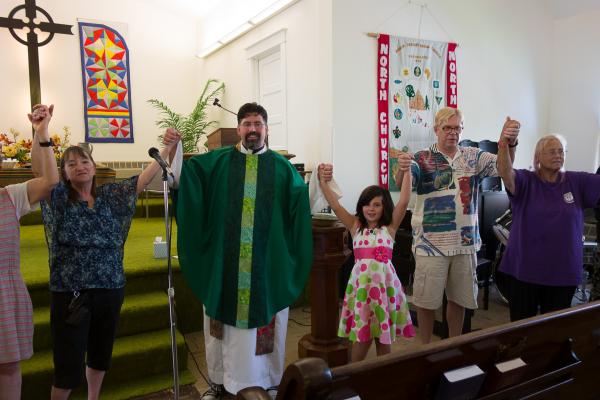Rev. J. Barrett Lee is pastor of North Presbyterian Church in Kalamazoo, Mich., whose mission is to "practice our ministry alongside people who live with mental illness."
Website: wearenorth.org
1. Why is it important to talk about mental illness? The only time people want to talk about mental illness as a broad social issue is when a mass shooting occurs. It’s a huge problem because it perpetuates the myths of what mental illness is and how people with mental illness operate. People think, “What if some mentally ill person gets a gun and is going to shoot up a church or a school?” But the reality is that people who live with mental illness are actually 10 times more likely to be victims of violence than perpetrators of violence. I don’t know a single person in my church who even owns a gun.
2. How is North Presbyterian’s call to ministry unique? We decided that our ministry with people living with mental illness was not going to be a side project. It wasn’t going to be something we did in addition to our ministry. We felt God calling us to reorient the entire life of our congregation around making a space where all people can be treated as equal partners in Christ’s service. We started the Togetherness Group, a weekly social activities group where the whole goal is to be together. We do lots of fun activities, whether that’s going out to lunch, going to the zoo, or just playing bingo on a rainy day. For a lot of folks, this is their one safe space each week when they can get out of the house, be treated like a human, embrace their own humanity, have a good time, and take some of the pressure off of daily living.
3. So what does Sunday worship look like? We recognize life is messy, so our worship is messy too. We have these large sections of our service we deliberately allow to get out of hand. The prayers of the people is the longest and most central part of our service. We have this time where people are able to name the stresses and the needs that they might be carrying with them into worship. When you have a community of people accustomed to not being listened to during their week in a room where they can name their needs—and then have people join them in prayer or thanksgiving—that is spiritually powerful.
4. How can other churches learn from North Church? One in five people live with mental illness in this country. Most people do a great job of hiding it because we’re taught that mental illness is something shameful. But when people hide a mental health illness, they can become sicker. But there is some real good news I think North can offer, and it’s that you don’t have to be alone. Because where brokenness abounds, grace abounds all the more.
5. What have you learned about ministry? It’s about ministry with, not ministry to. Every single person who comes to be part of our church is someone who has a need of some kind, but also has a gift and a calling. We have one member of our church who is profoundly disabled, both physically and cognitively, and at the end of the processional at the beginning of worship each Sunday, she shuffles to the front of the church with her walker and hands me a glass of water as service begins. And that is her ministry; that is her gift.

Got something to say about what you're reading? We value your feedback!

